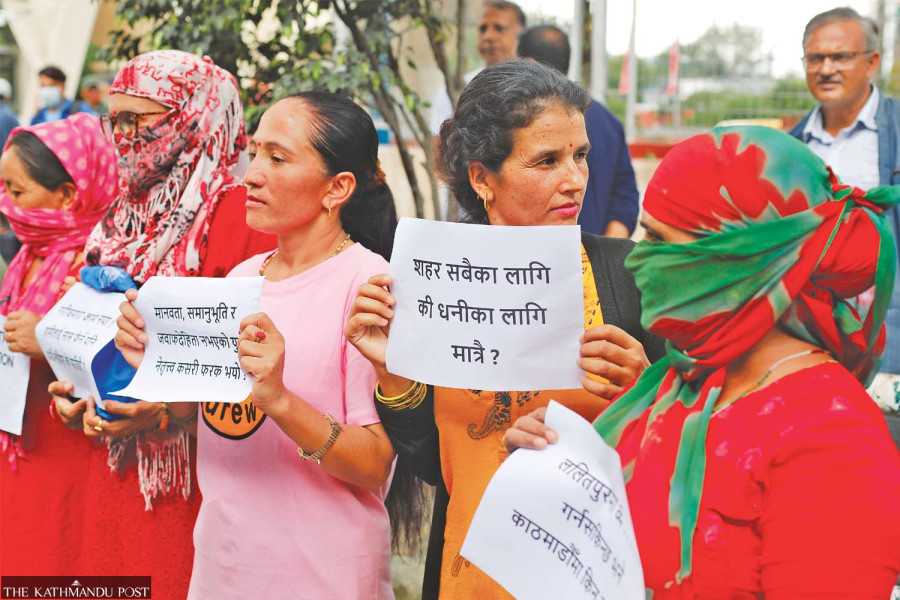Kathmandu
Street vendors up in arms against KMC’s indifference
Officials say they have selected three places for vendors to run their businesses, but would reveal them only after an agreement with residents.
Anup Ojha
On Sunday, a group of street vendors, including those operating out of bicycles and pushcarts, gathered in front of the City Hall to protest the Kathmandu Metropolitan City’s crackdown on them. The protesters chanted slogans against the KMC and its mayor Balendra Shah and displayed placards, one of which read, “Does this city belong to all or only the rich?”
This is not the first time street vendors of Kathmandu have been up in arms. They complain that the KMC has ignored their repeated protests and vow to intensify the demonstrations if the metropolis continues to give them the cold shoulder.
After Balendra Shah was elected Kathmandu mayor, he began stringently cracking down on street vendors, a move for which he has received much backlash. Videos of City police’s “inhumane” treatment of street vendors routinely make rounds of social media. For instance, in a video posted on the social network X on July 9, a municipal policeman is seen thrashing a vendor, with a bucket full of mangos and bananas falling onto the road from his bicycle. The vendor is heard wailing. Following widespread condemnation, the KMC publicly announced its action against a dozen City police personnel for misbehaving with street vendors.
“This action makes no sense unless the KMC makes a conducive environment for us to do business,” said Kumar Sapkota, chairperson of Nepal Independence Street Vendor Trade Union, which has more than 8,000 members.
Sunday’s protest was supported by the youth-led ‘Enough is Enough’ group, which demanded the KMC stop oppressing working-class people and provide alternative places for the vendors to run their businesses.
Those who work in the informal sector and make a living by selling vegetables, clothes, and fruits say that the city has become increasingly unsafe for them.
“Now we are united to speak against the KMC’s injustice against us,” said Sapkota. “If the KMC keeps kicking in the vendors’ empty stomachs, it will have to bear the consequences. A hungry stomach can do anything.”
Ishwor Man Dangol, the KMC spokesperson, said mayor Shah is concerned about the issue of street vendors.
Just before fighting the local election as an independent, Shah had vowed to manage street vendors in the Capital. In an interview with the AP1 television, Shah had said that the task of the city police is not to throw away vendors’ goods or mishandle them but instead manage them.
“We are equally concerned about the street vendors, and all the 32 ward chairs of the KMC are concerned about managing the vendors,” said Dangol.
He said the KMC has given three options to vendors to let them run their businesses under a new model. Dangol, however, didn't elaborate.
“We will only tell the media once we consult and confirm with the locals about letting their areas be used by vendors for a certain time,” said Dangol.
KMC officials said they have chosen select places for vendors to run their businesses that see more public movement.
But this is not the first time KMC has made such a promise. Earlier, regarding garbage management, the KMC in September last year had announced plans to convert waste into manure and sell it in the market. The KMC had also said it had looked for a few alternative open spaces. In nearly a year since, the KMC has not been successful in managing garbage systematically. On a question by the Post as to why they could not find a place for waste disposal, officials said they were still looking for a proper place.
“Vendors want to operate out of only those places where there is enough public movement,” Sapkota said. “The KMC could even collect tax from us, but it should be minimal.”
According to the union, there are more than 15,000 people in the Kathmandu district who depend on small-scale businesses to provide for their families. Many of them have quit their businesses after the KMC took stringent measures to uproot them. However, a majority of them are still plying their trades on roadsides, braving KMC’s high handedness.




 9.51°C Kathmandu
9.51°C Kathmandu.jpg)











